Oct 10, 2019
Stars in their eyes in rural Shizuoka
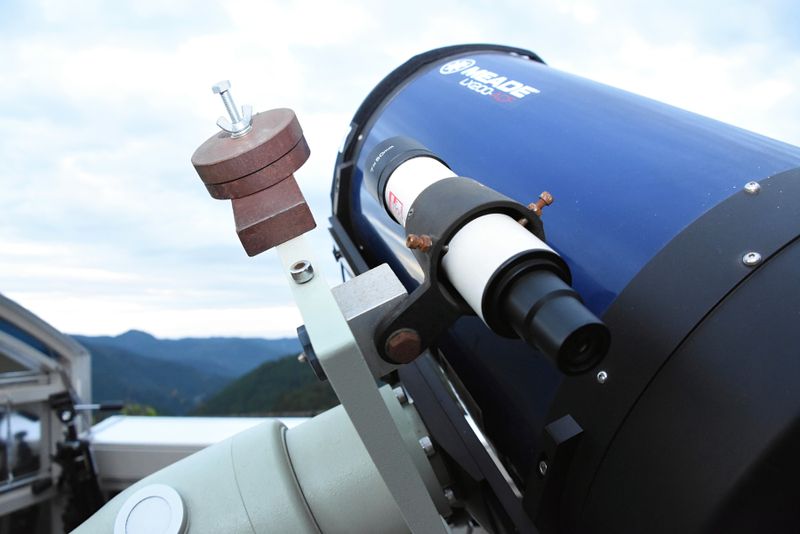
In the fall of 2018 team City-Cost packed themselves into the back of a rental, along with an office-supply of laptops, portable Wi-Fi routers, camera gear … and a drone, and escaped from Tokyo, heading southwest to Shizuoka Prefecture and the rural town of Enshu Morimachi.
The goal was to report from the front lines of the rural life in Japan and talk to people who had made the transition from city to country be it for work, retirement, pleasure, or just the better life. The calmer life. We listened intently to their stories, their struggles, and their hopes.
It was inspiring stuff and this jittery city-slicker for one was envious of the quiet sense of calm that the people we met in Morimachi seemed to harness, like they knew something I didn’t.
As we crammed the reportage kit and accoutrements, scuffed and frayed with countryside-life scars, back into the rental on our final morning in town we did so with the heavy heart that comes with having to leave something special behind. Something better.
On the Tomei Expressway back into Tokyo, in the face of the brutal skyscrapers of the Japanese capital and the awful prospect of the office, this reporter told themselves that they were damn well going to make some changes.
Nearly a year later and I’m typing these words from that same office. Nothing has changed.
Still, I do go back to Morimachi from time to time, particularly on those days when I’m over-caffeinated, over-tasked and ready to scream. I stare beyond the screen of my monitor, rise above the nervous prospect of having to answer the office phone in Japanese, and typically go to one place …
We were well into the back half of a day that had been spent chasing around the mountains and through the valleys that spread north of downtown Morimachi, such as that is.
With one interview left to go on this particular day, we ditched the tiring half of team City-Cost and left them at a campsite to get to work on dinner.
There are two prominent valleys that cut through the mountains immediately north of town. We were in the wrong one so it meant going back towards town to pick up Route 58 at the point where it forks left into the other valley, the right one this time, and through the district of Mori, winding ever further from the civility of shops and services.
Dusk was beginning to set in by the time we reached the district of Mikura about 10 km north of town where we struggled with tired minds, useless GPS and diminishing cell-phone reception in our attempts to reach destination’s end somewhere up on the mountain slopes a little further north.
I could sense the driving member of team City-Cost getting exasperated as we seemed to be running out of light, and road. On my part, I flushed with a sense of guilt -- it had been my idea to come all this way and now I felt this winding mountain road was snaking us into some Conradian heart of darkness -- city boys losing their marbles in the thickening, darkening mountains.
Minoru Owada put me immediately at ease. The retired teacher and amateur astronomer was waiting for us a few feet down the road from his observatory-cum-second home that sat on a lofty 340-m perch looking over a patchwork of tea fields and beyond them to the forested mountains in the south.
We had come to Morimachi to discover a sense of the rural life, but I had spotted Owada’s stargazing observatory in the information for an open-house event that the town had held prior to our visit and I had immediately wanted to visit -- the night lights of Tokyo tend towards lurid nightlife neons and the gridded monotony of overtime at the office. Rare is the opportunity to look up at the glittering splendor of nature’s own nighttime display.
We talked with Owada, standing inside his small observatory (the roof open) eyes moving between the impressive mountain view and the, almost, equally impressive telescope.
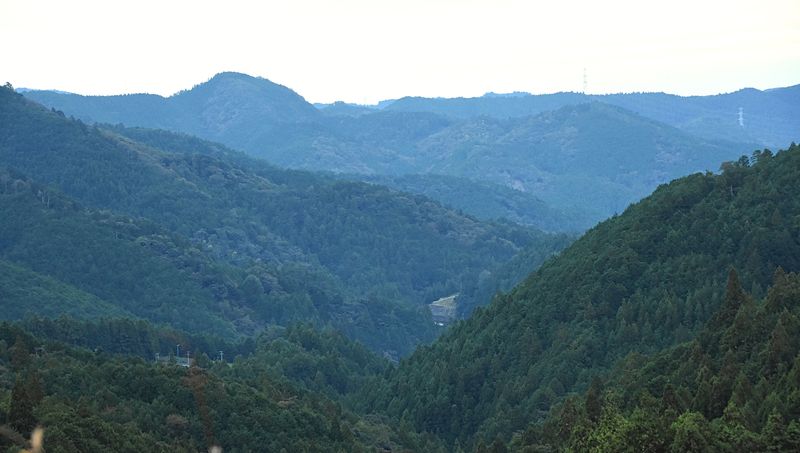
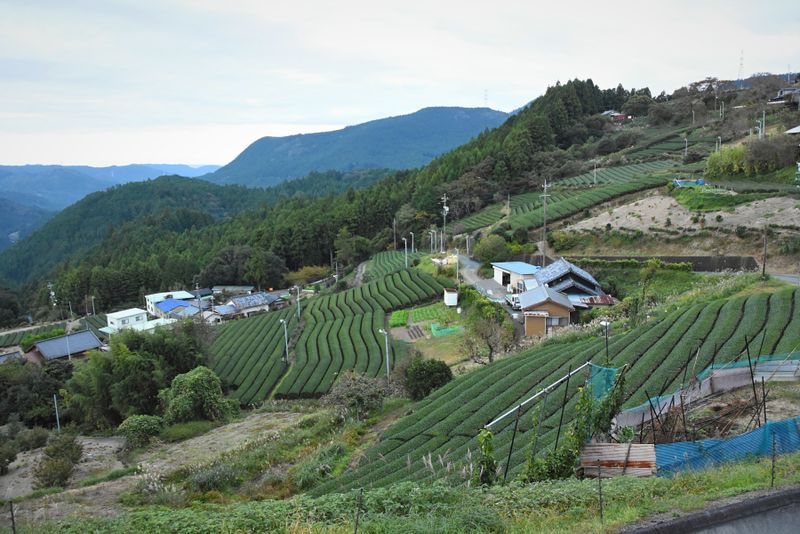
(Views from Minoru Owada's observatory in rural Shizuoka Prefecture, special even without the stars)
Owada, who comes from Hamamatsu, west of Morimachi, told us he had been visiting his observatory and second home since 2004, usually on weekends or on those occasions when the opportunity to view astronomical phenomena presented itself.
The observatory, the telescope were perhaps the fruits then of a pursuit that began for Owada when he was in junior high school, in the days when it was dark enough in town to see the Milky Way, he told us.
We asked if we could see the telescope in action. Owada duly obliged, typing into a computer the coordinates of longitude and latitude that set the impressive bit of kit into motion that would have it search out Saturn. Alas, it was too cloudy.
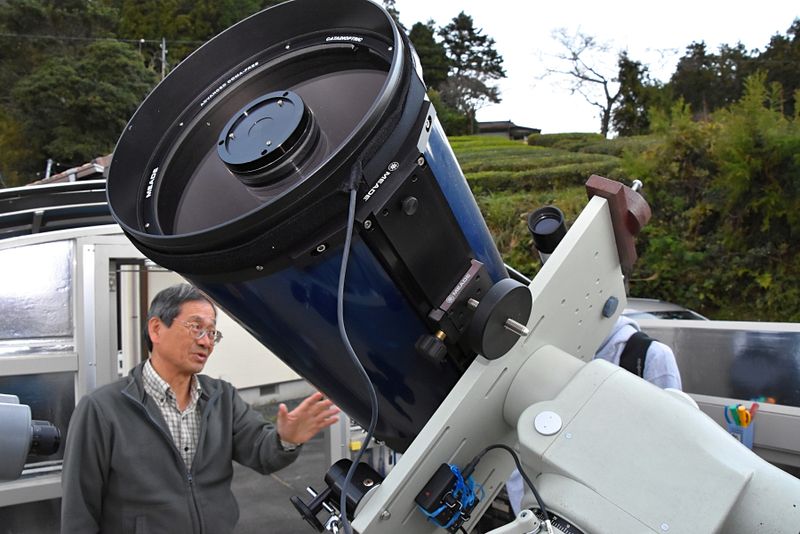
(Minoru Owada talks us through the tech behind his observatory)
Still, the observatory and telescope might seem similarly distant from the more manual stargazing days of his youth.
“When I was a kid I would search for stars using a star chart in my hand and compare it to the sky,” Owada explained.
“But now you can find them easily using a smartphone in which a GPS system shows you the star’s name when you raise your phone to the sky.”
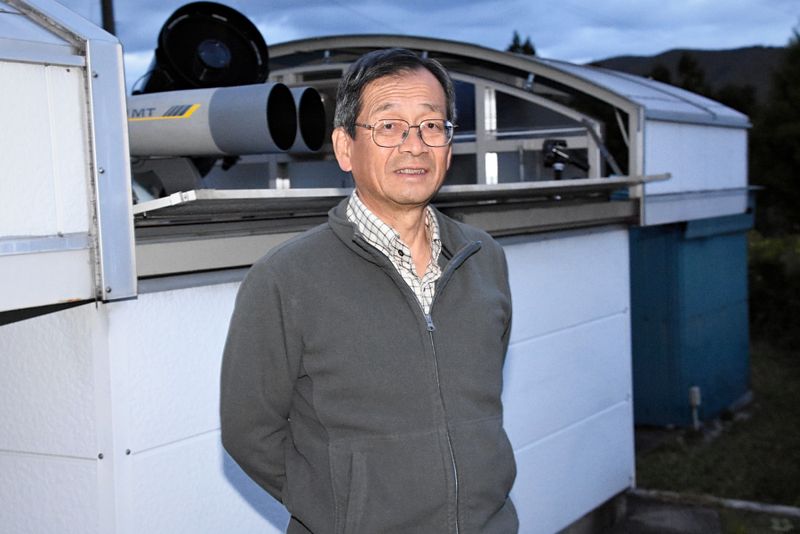
(Amateur astronomer Minoru Owada outside his observatory in the mountains outside of Morimachi, Shizuoka Prefecture)
While such advances in accessible, affordable technology, along with readily available information regarding the timing of solar and lunar eclipses and the presence of meteor showers, might have brought the stars closer they may also serve to highlight just how special this remote outpost on the edge of Morimachi really is.
“Last summer Mars was close, so some facilities probably opened that kind event for the public,” said Owada when we asked him if Japan provided other opportunities to gaze up at the night sky.
“Dozens of participants share a telescope though, so it could only be for a minute for each person,” he explained.
In fact, even light research would appear to reveal the popularity for astronomy in Japan with the National Astronomical Observatory of Japan employing a lottery system for advance reservations to its monthly “Stargazing Parties” held at its Mitaka Campus in Tokyo.
Owada, though, had been generous enough to share the wealth of his precious stargazing-resource.
As a teacher he would sometimes bring his students on field trips to his observatory and in the spring of 2018 he took part in an open-house event through which resident’s of Morimachi showcased to visitors the appeals of their rural lifestyles and projects.
Dozens of people came to visit the observatory during the open-house event, according to Owada, who told us that even during the day, with the use of his telescope, first-magnitude stars and some planets can been seen.
“The local people have been so kind to me. This was a way to show my appreciation,” he explained of his decision to open the observatory for the event.
Owada, though, isn’t the only stargazer who hails from these parts. Rather, he’s in the esteemed company of another amateur astronomer -- Kaoru Ikeya, who comes from near Hamanako (Lake Hamana - west of central Hamamatsu in Shizuoka Prefecture) and has his name attached to a number of comets which he helped to discover.
It’s a high bar to have set, and one that this would-be stargazer couldn’t get their head around. And probably never will.
It doesn’t matter though. The view from Owada’s observatory, even without the telescope, and even with the clouds at dusk, was dazzling enough for the eyes of this city dweller. And even sat here in this office chair it’s a view that I return to from time to time such was the impact of the place.



0 Comments